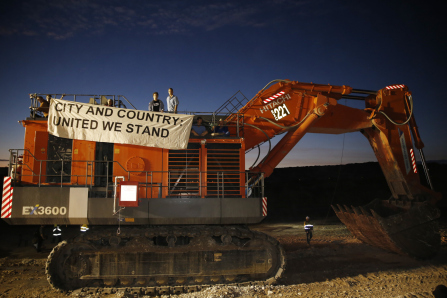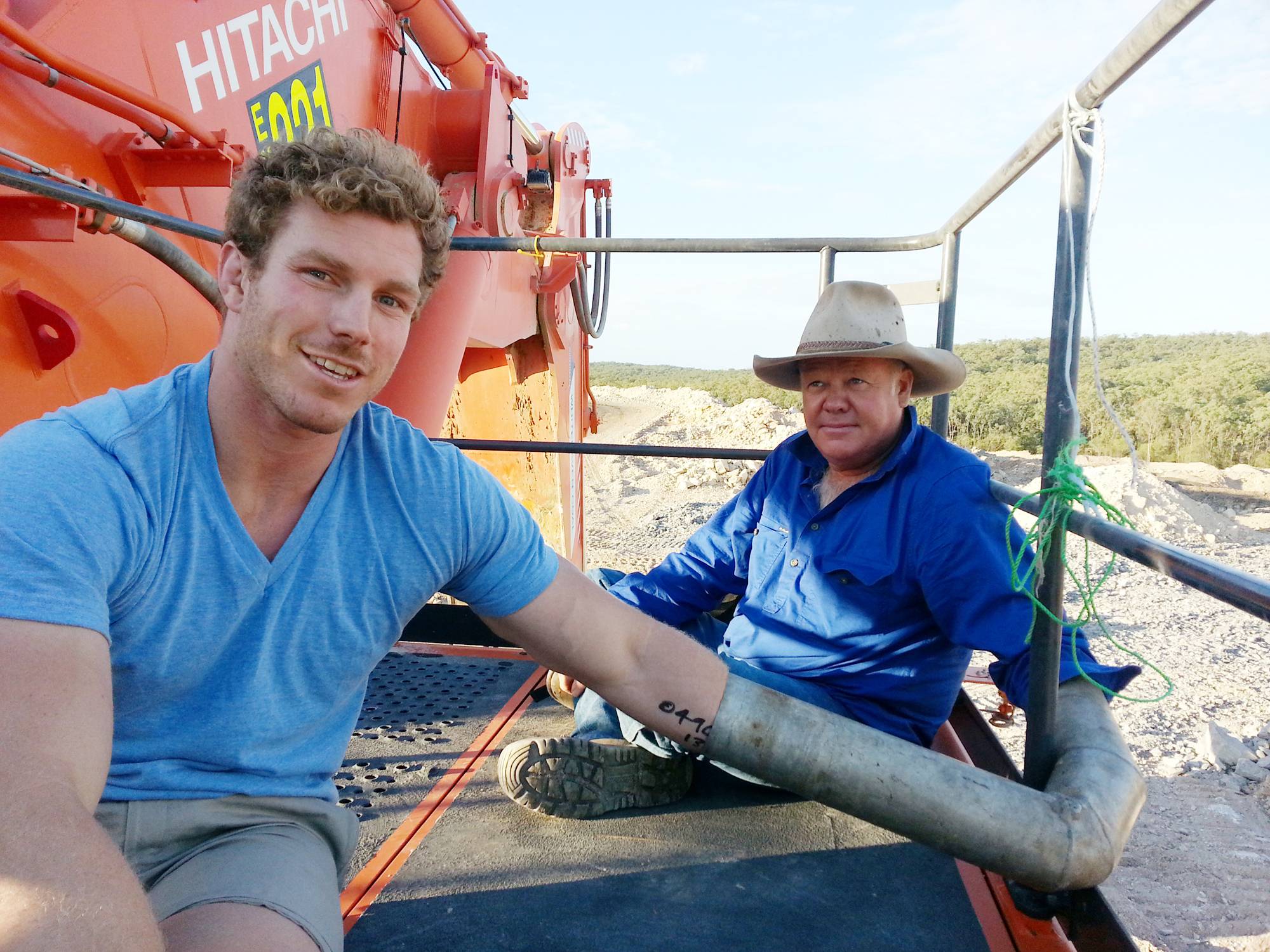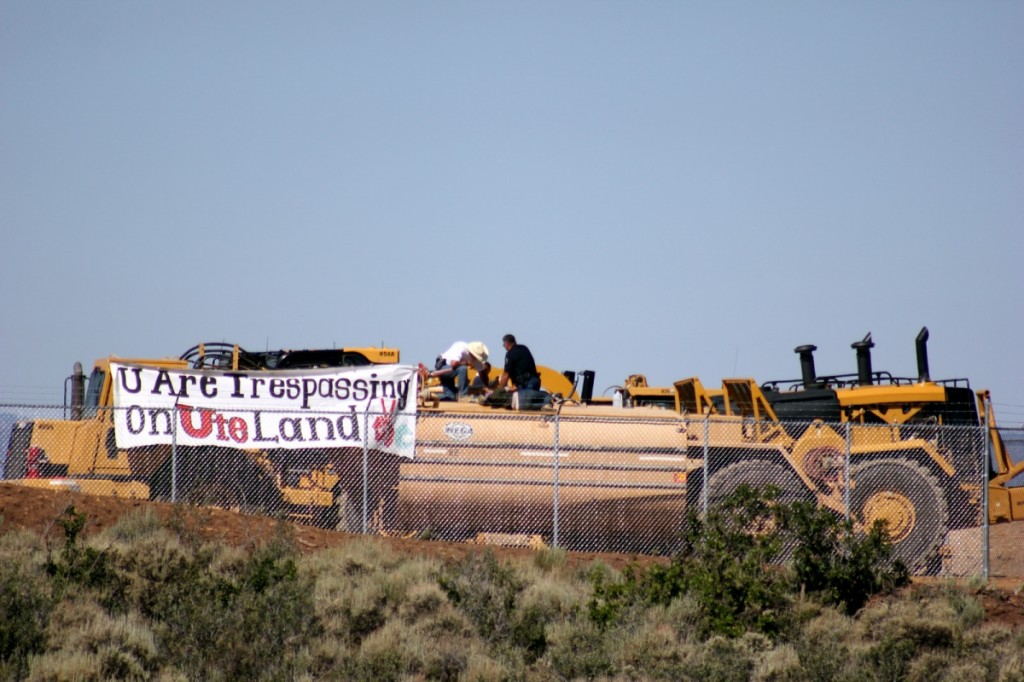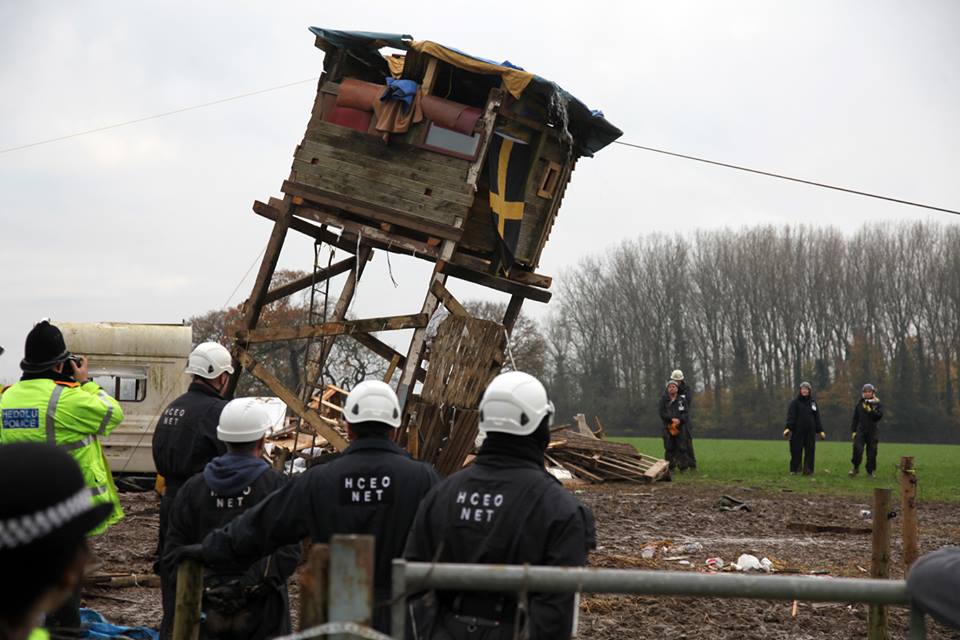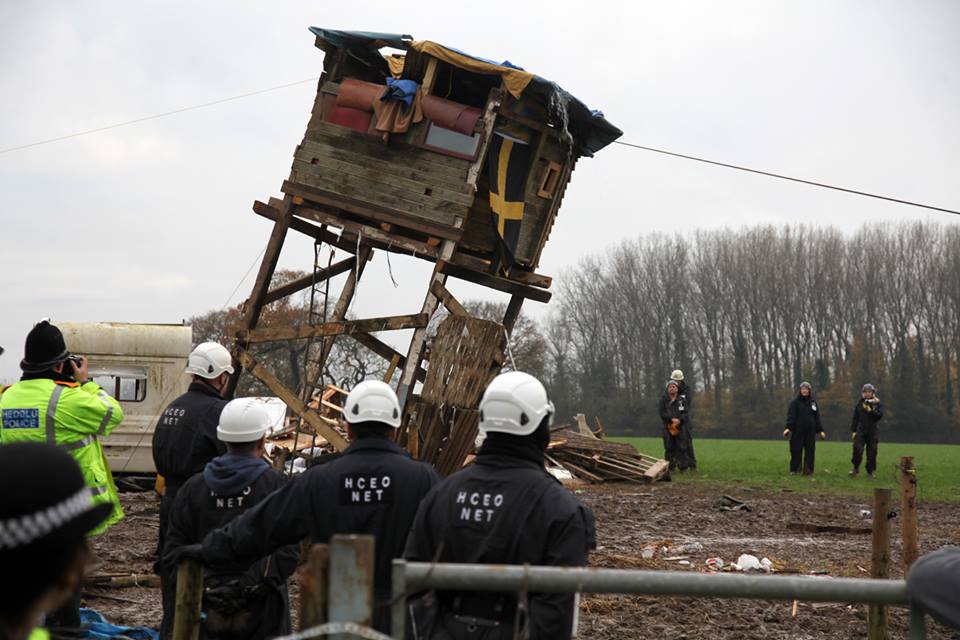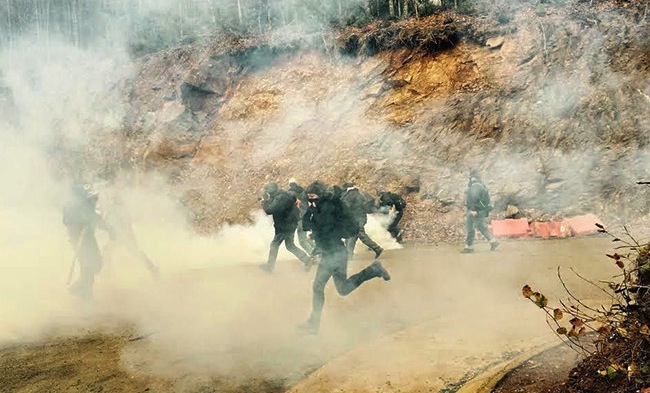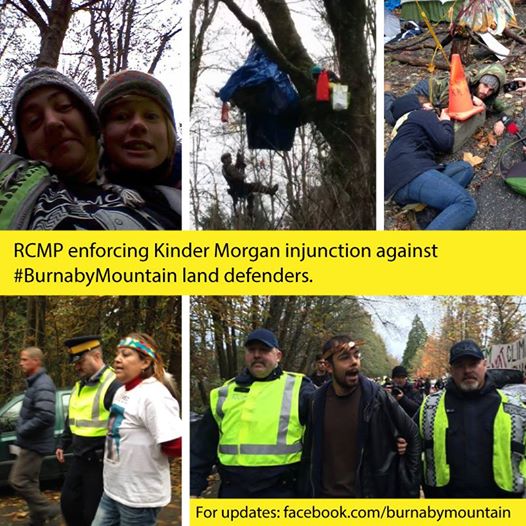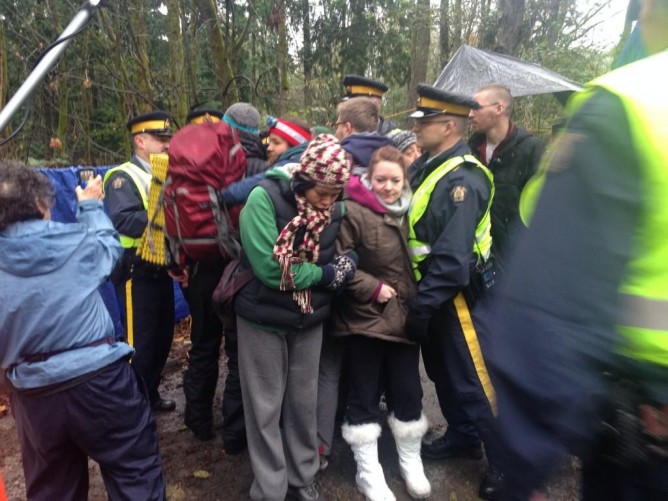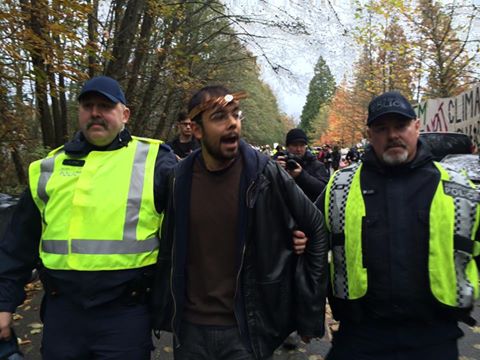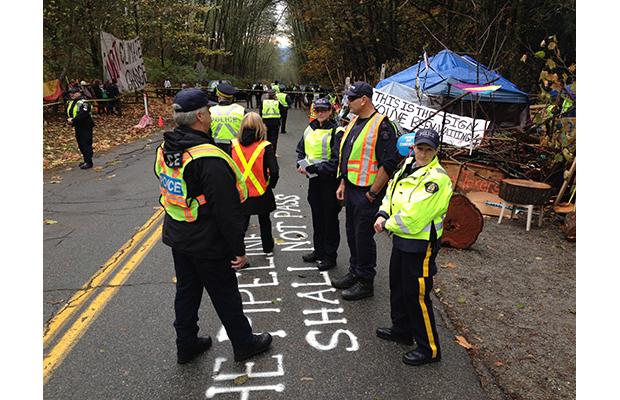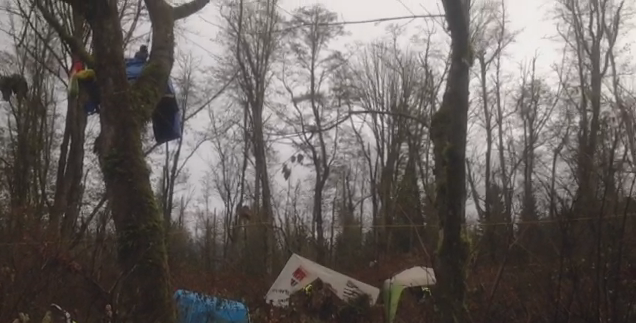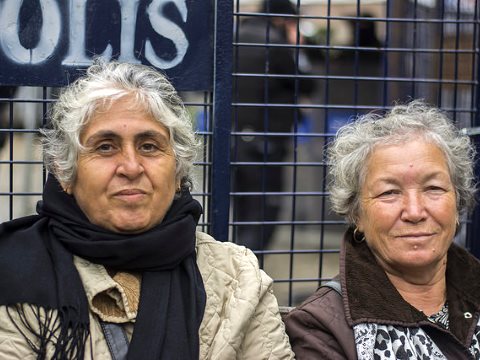
Zekiye Ozdemir and Gulseren Caliskan, both 70, maintain their daily vigil directly in front of a large iron police barrier at the construction site on the edge of Validebag Grove, Istanbul. November 26th, 2014
by Nick Ashdown / The Ecologist
Zekiye Ozdemir and Gulseren Caliskan, both 70, sit staidly in their wicker chairs directly in front of a large iron police barrier, undeterred by the cold mist wafting down from the grey sky above.
On one side of the fence lies a parking lot, now a forbidden zone. It’s guarded by a hulking water cannon truck and a detachment of heavily armoured riot police, many of their faces concealed by black scarves.
On the other side is a group of some 100 activists and concerned citizens protesting what they call an attack on one of the few large green spaces left in Istanbul. They’re handing out tea and snacks from under their makeshift tents and umbrellas, to stave off the inclement weather.
The matronly pensioners blithely chirp away, paying no attention to the dozens of police looming nearby. “We came here to say no to skyscrapers, to protect nature, and to support the youth.”, Ozdemir explains enthusiastically.
Validebag Grove – ‘it’s turning upper-middle class housewives into activists’
In early October, activists collected 80,000 signatures of people opposed to the Uskudar Municipality’s construction project that will include a small mosque, wedding halls, open-air theaters and artificial pools.
The construction site is in a parking lot on the very edge of Validebag Grove – home to some 7,000 trees and several historical buildings. The grove is in Uskudar, a hilly, mostly conservative district on Istanbul’s Asian side.
Hilmi Turkmen, mayor of Uskudar Municipality and member of Turkey’s ruling Justice and Development Party (AKP), has called the activists “fake environmentalists” and said that “Unfortunately too much tolerance and goodwill drives people wild and makes them believe that they are right.”
Activists accuse the government of politicizing their citizens. “They are turning upper-middle class housewives into activists”, says Cigdem Cidamli, an environmentalist with Istanbul City Defense.
Police violence – ‘they’re like an army!’
At the crack of dawn on 21 October, a police-escorted bulldozer crept into the parking lot and starting ripping up concrete. Furious activists called the excavation unlawful because the legal process was still pending, and started a 24-hour vigil that still continues.
Later that afternoon, an administrative court suspended the construction, saying the Uskudar Municipality didn’t have a license for the mosque. When activists announced the stay of execution, police attacked them with teargas.
“They’re like an army”, environmentalist Onur Akgul says, noting there are almost as many cops as activists. Akgul is a member of Northern Forests’ Defence, an environmental group formed after the Gezi protests of 2013, which were also sparked by commercial development of a central green space.
On 23 October, construction resumed despite the court order. “They’re not listening to the law”, Akgul says. “What’s happening now is purely illegal.”
Several prominent activists and a journalist have been detained and beaten by police, to the surprise of no one. Cidamli was amongst those detained. “They beat us”, she says. “They threatened me, [saying] ‘I will fuck you, and kill you, [and] shoot you.'”
On the weekend of 25 – 26 October, activists organized a march and a picnic, and police responded by erecting the iron barricade and bringing in the riot squad. The following Monday, protesters filled the road with their cards to block excavation equipment, and tow trucks came to remove them, some with the drivers still inside.
A couple of weeks later, a group of women tried to enter the construction site. One of them promised the riot police “we will just enter the grove, look around, and then leave”, adding “you are also our children.” When they tried to make their way past the police, they were immediately pepper sprayed.
Asian Istanbul – the new target for ‘urban transformation’
The Validebag Grove is a protected natural site, and a designated meeting spot during a natural disaster such as an earthquake.
The Uskudar Municipality is trying to annul the grove’s protected status, and activists say that because of Validebag’s location in an attractive residential neighbourhood, the Municipality wants to tear out trees and build more housing and commercial centres.
The ruling AK Party has been rapidly transforming Istanbul with a number of ‘urban transformation’ projects. Critics argue the changes are implemented from the top down with very little public consultation or regard for environmental effects, and that pro-AKP construction firms get the most lucrative bids.
They say laws have been altered to facilitate hasty construction and decrease the role of professional organizations responsible for ensuring high standards.
“Istanbul has become a city that is continuously under the assault of this urban transformation and privatization of public areas”, Cidanli says. Most of these projects have been undertaken on the European side of Istanbul, but according to Cidanli, “the Anatolian part of Istanbul is now under attack.”
Despite a dismal environmental record, Istanbul recently entered a competition to be the European Green Capital of 2017.
But according to British consulting agency World Cities Culture Forum, green spaces in Istanbul account for only 1.5% of the city – much smaller than other Europeans capitals such as London (38%), Berlin (14.4%), or Paris (9.40%).
Mosque a Trojan horse for commercial development
Cidanli fears this construction project is the first step in terminating Validebag’s protected status and opening the grove to commercial development. “This is a very profit-oriented project under the guise of a mosque”, she says. “They will go step by step”, slowly nibbling at the edges of the green space.
She says the municipality tried a month earlier to appropriate land in Validebag from the north with a project to build parking lots, but were unable to proceed due to opposition. Now, she says, they’re trying from the south.
Cidanli says these projects often start with a mosque because if anyone raises concerns, they’re accused of being Islamophobic in a very religious country. “Maybe they thought that if they say this will be a mosque, nobody would dare to oppose it”, she says.
President Erdogan, who has a private residence in Uskudar and has voiced support for the construction project, often attempts to stoke religious sentiment against his critics.
“Maybe some were uncomfortable because it is a masjid [small mosque]”, he told journalists on 25 October, accusing critics of the Validebag construction of being intolerant of Islam.
The opposition Republican People’s Party (CHP), whose members have visited and voiced support for demonstrators in Validebag, immediately shot back: “They are trying to use the mosque card to claim that people are against places of worship”, CHP deputy Mahmut Tanal told local news. “This is completely false.”
“We don’t have any problem with mosques”, Akgul, the environmentalist with Northern Forests’ Defence says, pointing out that many of the activists themselves are devout Muslims.
‘We don’t need any more mosques. We need oxygen!’
The issue has now been taken up by the main opposition Republican People’s Party (CHP). Its Deputy Chairman Sezgin Tanrikulu submitted a parliamentary question for Prime Minister Ahmet Davutoglu earlier this month about allegations that the Uskudar Municipality had agreed to turn parts of Validebag Grove into a car park. (The link has mysteriously been taken down but I accessed a cached version.)
According to Tanrikulu the construction of the mosque is “only for show” and the land will actually be allocated to a company linked to the ruling AK Party company. “What is the name of the company that signed an agreement with Üsküdar’s mayor for a car park on Validebag Grove?” he asked.
Religious or not, many of the demonstrators are staunch secularists, and have put up banners bearing the portrait of modern Turkey’s fiercely secular founder Mustafa Kemal Ataturk.
Some wonder why another mosque needs to be built in an area that already has 26, four of which are less than 600 metres away. “We don’t need any more mosques, says 70 year-old demonstrator Ozdemir. “We need oxygen!”
On October 31 the court’s stay of execution was reversed after an appeal, saying the project site lies outside of the protected grove. Some local papers and opposition politicians accused the Uskudar Municipality of interfering with the legal process, and lawyers representing the activists vowed to appeal the court’s reversal.
Among them was Tanrikulu – who claimed, in his parliamentary question, that the Municipality had tried to bypass the decision of the Istanbul 7th Administrative Court – which ordered a stop on construction at the site – by altering the sheet and parcel numbers of the car park.
Despite the unfavourable ruling, and the rising atmosphere of threat and initimidation from both government and police, the protestors are holding firm. And Ozdemir remains confident of ultimate victory, insisting: “The people will prevail!”

21st Nov 2014
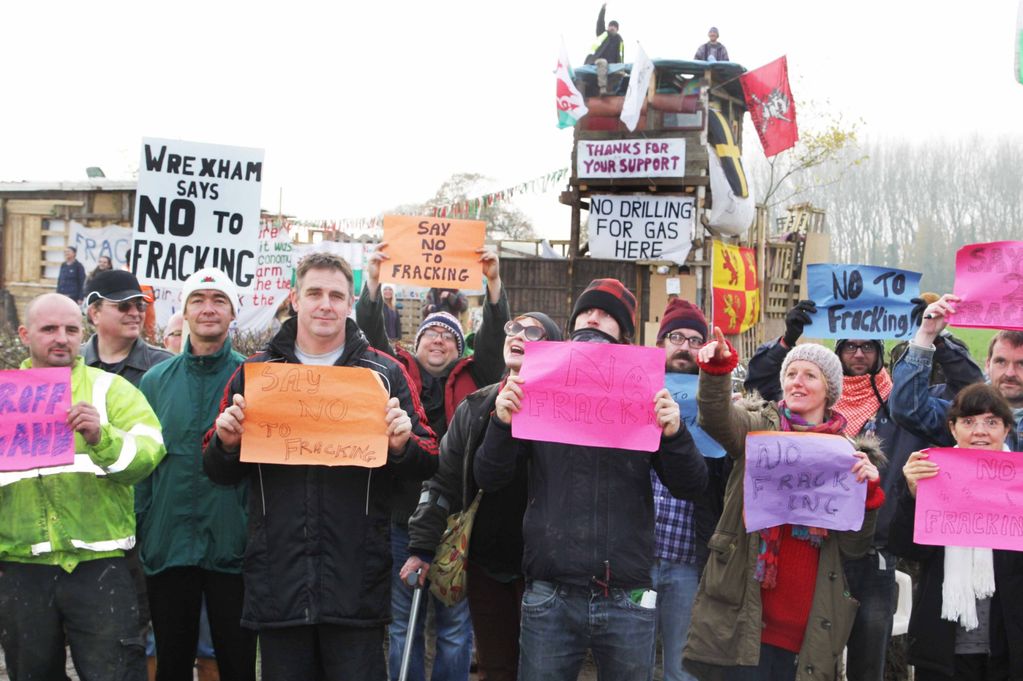
21st Nov 2014
Anti- fracking campaigners in Wrexham have until midnight tonight to leave a protest camp.
It comes after a failed courtroom bid today to stop bailiffs evicting them.
The protesters have not yet revealed whether they will comply with the order to hand back the land to the farmers who own it or resist the bailiffs.
Last month, protesters set up the Borras Community Protection Camp at Commonwood Farm, Wrexham to campaign against plans by GP Energy to explore the extraction of gas there.
Several weeks on and the small scale camp has been turned into a mini-community complete with a watchtower, shower, extended kitchen with food stocks, a caravan rest area, tepee play area for children and toilets.
Today’s Manchester High Court case involved an application on behalf of father and son landowners Terence Andrew Jones and Terence Neal Jones against persons unknown to take possession of the land where test drilling for gas is planneded.
The landowners were represented by a Queens’s Counsel barrister.
Marc Jones, of Frack Free Wrexham group, said the judge granted the “persons unknown” permission to stay at the site until 11.59pm on Friday when their camp must be cleared.
If the campers are not gone by the deadline then bailiffs can move in over the weekend.
Mr Jones said: “The option is to leave the site or stay there.”
Protesters against underground test drilling for gas had said they have been overwhelmed by the support they have received.
One of the protesters Chrissy, who did not wish to give her second name, said the level of support from the local community had been great.
She has said: “We have had so much support it has been overwhelming. The people around here are so much more clued up about what is going on and want to get involved.
“In other areas where we have been protesting and organised a public meeting, usually you get 20 people attending, 30 would be considered good.
“But when we had the first meeting at the Cunliffe Arms here, we had 150 people which was fantastic.
“People have been dropping off all kinds of supplies for us, from food to wood to build our shelters and burn for heat. We asked for one fire extinguisher and got 10. It’s amazing how quick this camp has built up.”
The camp was set up after Wrexham Council’s decision to refuse proposals to drill for underground gas there, was overturned.
Underground gas drilling has been shrouded in controversy across the world.
